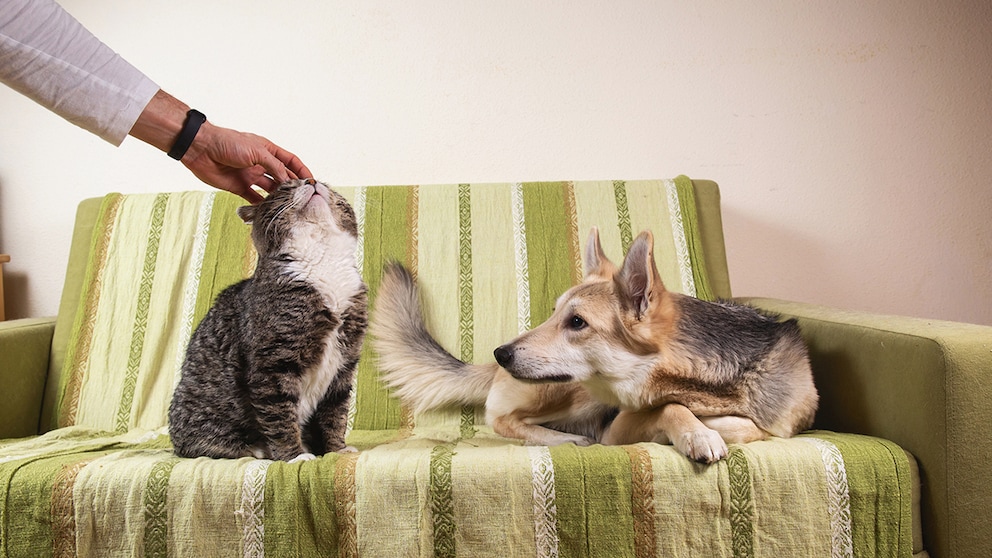February 7, 2025, 4:14 pm | Read time: 4 minutes
Many dog owners are familiar with the situation when their own dog intervenes as soon as they turn their attention to another dog. “Oh, he’s just jealous” is often the response. It is no wonder that envy often plays a major role in our lives, but can dogs also feel envy? PETBOOK has investigated.
“Is your bone bigger than mine?” – Envy is a complex emotion that we humans instinctively feel as soon as we are convinced that a person is getting or possessing something that they are not entitled to. I’ve actually observed this reaction in my own dog as well. As a dog health expert, I’ve delved into this question for PETBOOK to determine if our four-legged friends can also experience “envy.”
Dogs Can Feel Envy When They Feel Unfairly Treated
In 2008, researchers at the University of Vienna conducted a dog behavioral research experiment on this topic. They had two dogs sitting next to each other perform the previously learned command “give paw.” Both were initially given a reward. Later, however, only one of the dogs was rewarded – even without having given its paw. The scientists wanted to find out how the animals reacted to this “injustice.”
The unrewarded dog watched the situation with almost a hint of suspicion, hesitated, and showed a stronger reaction to its competitor, ultimately refusing to do anything further, clearly deeming it not worth the effort. The dog ceased to cooperate, appearing downright offended, hostile, and stressed, even more so than when faced with the same situation alone, without another dog by its side.
Dogs Feel Envy, but Not Resentment
This sensitive behavior due to unequal treatment was previously only known from great apes or humans. Before this experiment, it was assumed that the feeling of “envy” was deeply human, which once again proves that our dogs are more like us than we think.
In dogs, it’s likely a form of constructive envy, meaning the animal desires the same rewards without begrudging the other. The feeling of resentment, or destructive envy, where one wishes for the other to lose something or suffer harm, is probably not something dogs experience.
A Special Case: Food Envy
From a behavioral biology perspective, food envy in dogs is not comparable to the feeling of envy that we humans experience. It is more about defending resources in order to survive. This behavior can occur against conspecifics, other animals, and humans and can extend to food aggression.
Puppies commonly exhibit food envy. If they are born in large litters, they have to learn early on to assert themselves in the competition for their mother’s teats. This partly innate behavior is intended to ensure their survival but will change over time in order to lead a socially acceptable life. Dogs from animal shelters, those living on the streets, or neglected animals often prove to be exceptions. In such cases, specialized behavioral training is necessary.
“The Fable of the Envious Dog” from the 6th Century BC
The question of whether dogs can be envious has probably preoccupied people in the past. There is a fable by Aesop, an ancient Greek poet, on this subject. However, it was not translated from Latin until the 12th century. Aesop’s fables deal with human weaknesses, including envy, in which animals talk to each other and display human characteristics.
The fable, titled “The Fable of the Envious Dog: Envy is very nasty – listen to this fable and examine yourselves,” unfolds as follows: A dog found an old, gnawed bone that he didn’t want to give to anyone else and lay down in a manger full of hay. When the ox and the donkey came back from their work to their manger, he would not let them eat it, so he bared his teeth at them and growled angrily. Then the ox said to him: “You are being unfair by envying us the hay, for even though you cannot eat it, you want to prevent us from eating it as well. (Fables of Aesop: The 41st fable, about the envious dog)

Merely employees and can openers? How do our cats see us

Can dogs feel shame? A biologist answers

Cats learn new words faster than toddlers
Conclusion
There’s truth to the saying: “Two dogs find it hard to agree on a bone.” Envy is a social phenomenon that arises when individuals compare themselves with one another. The individuals feeling envy typically perceive themselves as being treated unfairly and at a disadvantage. Such situations and the associated behavior are omnipresent in our dogs’ everyday lives. Whether it’s the bigger bone, the better treat, the more exciting toy, or more attention, our dogs are probably very similar to us in this respect.

